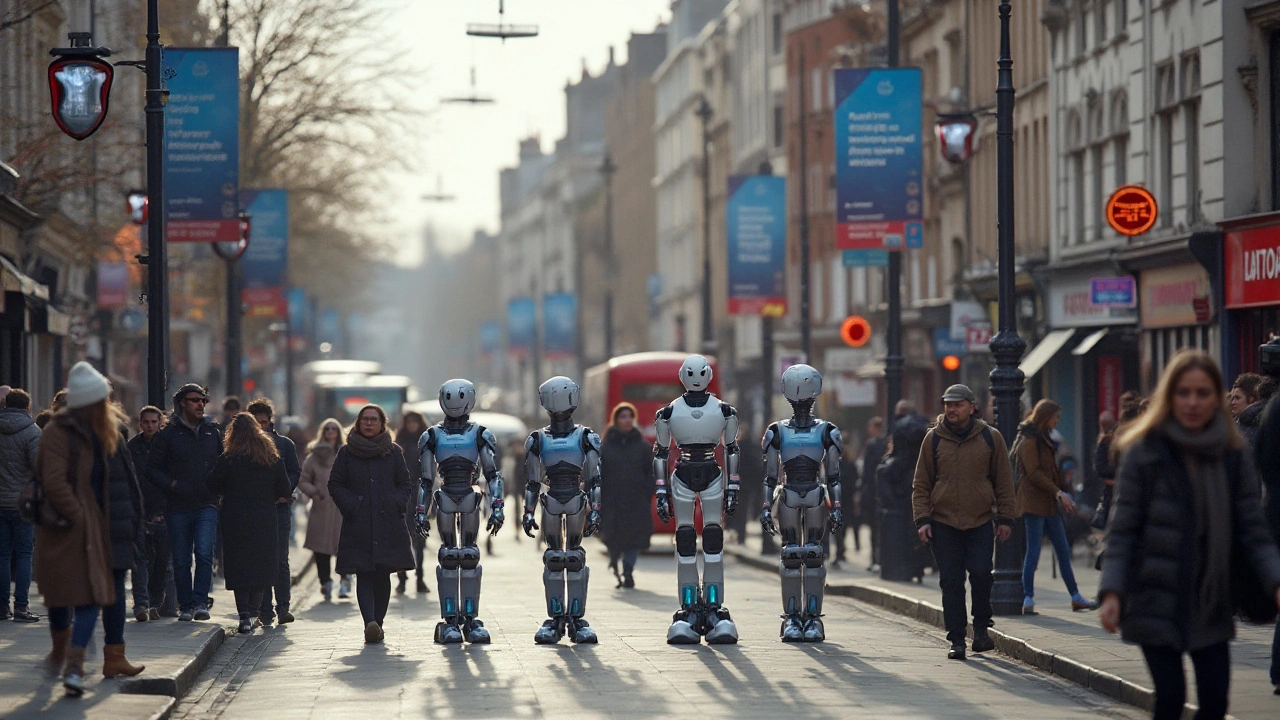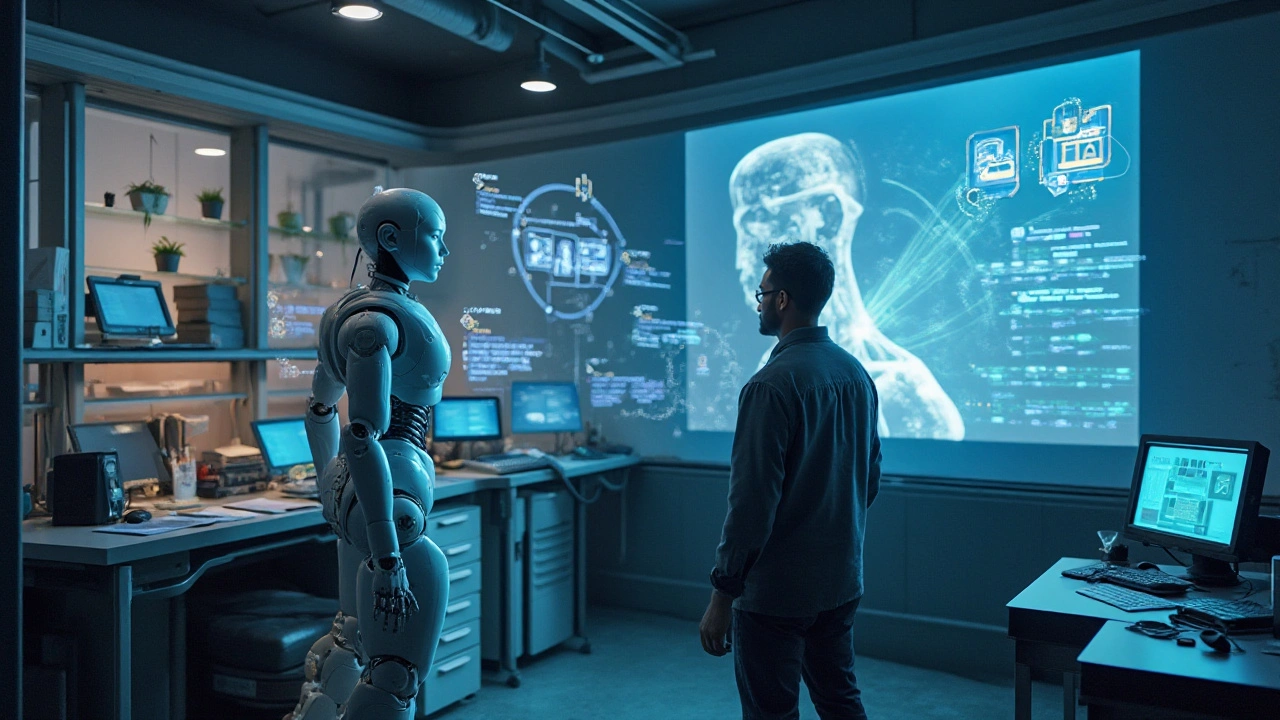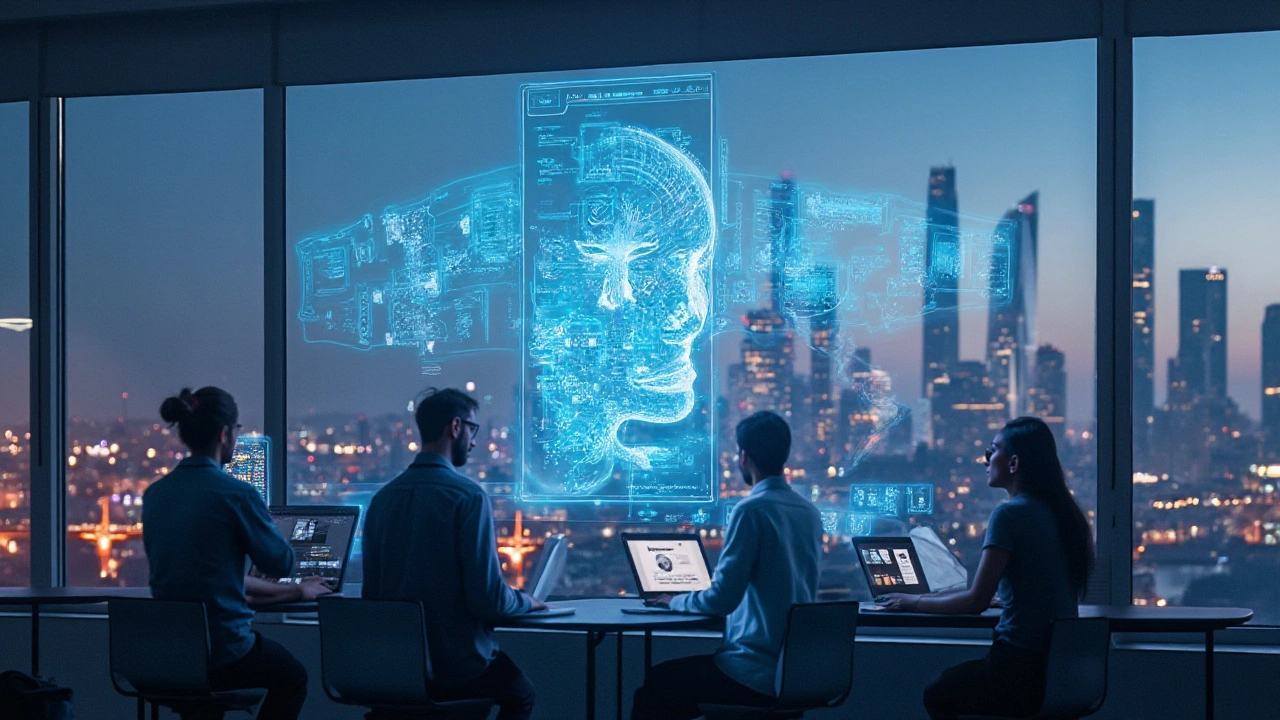Artificial General Intelligence, or AGI, is often described as the holy grail of AI research—a level of machine intelligence where systems possess the ability to understand, learn, and apply knowledge in a generalized manner, akin to human intelligence. As we dive deeper into the digital age, the line between science fiction and reality begins to blur, opening doors to unprecedented innovations.
The capability of AGI stretches far beyond the specialized tasks that today's AI systems can accomplish. It's about building machines with the ability to perform any intellectual task where humans excel. Imagine computers that not only assist in chess or language translations but can also plan weddings, diagnose diseases, or even teach in a nuanced and comprehensive manner. The possibilities seem as endless as they are fascinating.
Understanding AGI
When we talk about Artificial General Intelligence, we are venturing into a frontier where computers could potentially think and reason just like humans. Unlike the AI technologies we are familiar with today, which are designed for specific tasks—like a chatbot that can answer your questions about bank accounts or an app that can sort your photos—AGI would possess the cognitive abilities that allow it to tackle any intellectual challenge. This means such an AI could excel in varied fields, adapting and learning just as a human does. The journey toward achieving AGI is fraught with both excitement and caution, where researchers and technologists are exploring how to imbue machines with such versatile intelligence.
The concepts supporting AGI are not new, tracing back to early computer science theories where pioneers envisioned machines capable of going beyond calculations. Machines, they imagined, would one day mimic human learning and problem-solving. This dream remains a significant goal in the AI community, driven by advances in machine learning and neural networks. These technologies have made strides toward AGI by structuring algorithms that can analyze data patterns, make predictions, and even evolve with minimal human intervention. However, the quest for true AGI goes beyond technical hurdles; it involves understanding the intricate workings of the human mind and replicating this in artificial forms.
Creating AGI involves a complex amalgamation of technologies orchestrated to simulate human understanding, senses, and emotions. Educational systems, languages, and sensory perceptions are focal points in this exploration. Historically, computers have doubled their capabilities approximately every two years—a principle widely known as Moore's Law—and researchers hope that the pace of advancement will lead us closer to AGI. However, achieving the fluidity and depth of human intelligence in machines is a feat of a different magnitude. The challenges are not merely technical but philosophical and ethical, requiring a multi-disciplinary approach to address them.
Despite these challenges, there is optimism. AGI could revolutionize industries ranging from healthcare to logistics, heralding a future where machines not only assist in diagnostics or data analysis but also make creative leaps in understanding new problems. According to Ray Kurzweil, a prominent futurist, "We are approaching a time when machines will be fully capable of simulating human intelligence and emotion." This perspective motivates ongoing research and discussion about the transformative possibilities that AGI could bring. Such an evolution in future technology promises not only enhanced productivity but also a potential shift in how humanity interacts with technology.

Current AI Versus AGI
Artificial Intelligence as we know it today is quite remarkable in its own ways, yet it differs fundamentally from the concept of Artificial General Intelligence. Our current AI systems, often described as narrow or weak AI, are designed to excel at specific tasks. Whether it's playing chess, translating languages, recognizing faces, or recommending products, these systems are highly efficient yet limited because they're built for particular purposes. These applications have embedded intelligence that's deeply reliant on pre-defined data sets and algorithms tailored precisely to perform known tasks effectively. They do not understand or learn beyond their programs, making their intelligence quite different from the broader, adaptive intelligence AGI promises.
Think of it as the difference between a professional actor trained to deliver one role superbly and an untrained artist capable of improvising an array of emotions and actions spontaneously. While current AI relies heavily on what it has been fed—sets of data that guide decisions and predictions—AGI would hypothetically be capable of reason, abstraction, and problem-solving across diverse domains. It wouldn't just play a game of chess; it could ponder the strategies, learn new games, and perhaps even invent its own. According to Dr. Ben Goertzel, an AI researcher known for his work on AGI, "AGI is not just about solving particular problems but about creating systems that can adapt, learn, and grow across a wide range of human endeavors."
Technology Underpinning AI
The backbone of today's AI technology lies in machine learning and deep learning. These technologies enable systems to identify patterns and make decisions, yet they do so within the scope prescribed by their initial design. For instance, a virtual assistant might learn from users' voices to improve accuracy, but it cannot independently evolve to decide what conversations should be prioritized without substantial programming changes. Neural networks, which mimic the function of the human brain, are powerful yet constrained by their architecture and the data they're given, operating under the narrow AI umbrella.
As intriguing as these systems are, pushing the frontier toward AGI involves a shift. It requires a self-improving architecture where learning happens beyond initial parameters, allowing systems to reason, plan, and adapt to novel situations as a human would do. Machine learning algorithms underpinning AI development today may evolve, but the challenge lies in embedding a form of consciousness or self-guided learning into machines. This aspect differentiates AGI—aiming for an intelligence that is not just programmable but autonomously developmental, mimicking the complexities of the human brain.

Societal Impacts and Ethics
As technology continues to evolve at a breakneck pace, the potential arrival of Artificial General Intelligence (AGI) into our daily lives promises to be both a disruptive and transformative event. This shift could revolutionize numerous industries, impacting everything from healthcare and finance to entertainment and education. However, the introduction of AGI also brings with it a flurry of ethical questions and societal impacts that we must carefully consider.
One of the most profound societal impacts of AGI could be seen in the workforce. There is a looming potential for these intelligent systems to take over jobs traditionally performed by humans, leading to massive shifts in employment landscapes. While some argue that AGI could enhance productivity, allowing humans more leisure time, others warn that it could exacerbate inequalities if only a handful of individuals control these powerful technologies. For instance, history has shown that every major technological advance has altered economic structures, and AGI might be no different, potentially leading to a significant paradigm shift similar to the Industrial Revolution.
The ethical considerations surrounding AGI pose complex questions. What values should such powerful systems be programmed with? How do we ensure AGI systems make decisions that align with human morals? There's an inherent risk of bias, as these systems might inherit or even amplify biases present in the data they are trained on. It's crucial to develop a framework that ensures fairness and neutrality in AGI systems, a topic currently being explored by numerous institutions worldwide.
"The development of AGI with egalitarian value is not just an opportunity but an obligation," says Dr. Kate Crawford, a researcher at AI Now Institute, emphasizing the importance of ethical frameworks in AI development.
Moreover, the introduction of AGI into our lives raises privacy issues, as these systems could gather and analyze personal data at unprecedented scales. With immense data comes great potential for misuse, making it imperative for regulations to evolve alongside technology to protect individual privacy without stifling innovation. The balance between technological advancement and ethical standards is delicate, and the decisions made during the formative years of AGI's development will shape generations to come.
On a brighter note, if harnessed correctly, AGI holds the potential to tackle some of humanity's most pressing challenges, such as climate change and global health crises. Some experts believe AGI could innovate in ways we can't yet imagine, offering novel solutions to resource management, transportation, and disease eradication. With this incredible power, the responsibility rests heavily on today's thinkers, lawmakers, and engineers to carve a path that is equitable and just.

Future Prospects and Challenges
As we stand on the brink of realizing Artificial General Intelligence, the future seems both exciting and daunting. The transformation that AGI could bring is like witnessing the industrial revolution in fast-forward with the potential for impact across every sector of society. With future technology aimed at achieving AGI, tasks that seem impossibly human today might soon fall within the grasp of machines, from complex problem-solving to creative tasks.
One of the promising prospects of AGI is its application in environmental management. Imagine leveraging AGI to analyze climate data and develop sustainable solutions, accelerating our fight against climate change. These intelligent systems can process vast amounts of data to suggest actions that might take humans decades to compute independently. Businesses, governments, and NGOs could all benefit from such innovations, driving global efforts towards creating a safer planet with more resources for everyone.
Yet, the challenges accompanying these exciting opportunities cannot be ignored. One pressing challenge is ensuring that this leap does not result in excessive reliance on machines, overshadowing human skills and employment. As machines potentially take over more roles traditionally handled by people, it becomes crucial to consider how labor markets are structured and how societies will manage these changes. This could mean rethinking education, employment policies, and societal norms to accommodate a future where human and machine collaboration is the norm.
"Technology, if deployed wisely, will vastly augment human capabilities and enable us to do unprecedented things. However, its reckless application could be detrimental to basic human values." - John McCarthy, pioneer of artificial intelligence
Then there's the need for stringent ethical guidelines and governance to regulate AGI development and deployment. The question remains about who gets to control such a powerful tool, and how its objectives are aligned with human welfare. Without a doubt, this requires an unprecedented level of collaboration across borders, industries, and disciplines. We need a shared framework that establishes norms and practices to ensure that AI development aligns with societal good, balancing innovation with responsibility.
A thought-provoking aspect to consider is how AGI might influence our personal lives. Could it lead to a world where every individual has access to a personal advisor, a health companion, or a learning coach? These systems would understand and anticipate our needs, taking customer and personal care services to a new level. Such possibilities, thrilling as they are, raise questions about privacy, data security, and personal agency. Adapting to these changes will require a grounded approach, ensuring that tech enhancement goes hand in hand with ethical considerations.

